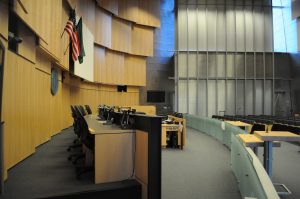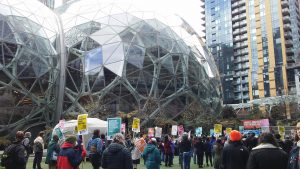Voting in Seattle

In a local election that drew some national attention, with former presidential candidate Bernie Sanders making endorsements, self-described progressive candidates faced off with more conservative business interests in a series of elections for local offices throughout the city of Seattle and Martin Luther King County.
All ballots had been dropped off or mailed as of Nov 3rd, but the elections will not be officially certified until later this month.
Close voting results for election to the offices of Port Commissioner and to the Martin Luther King County Commission were still too close to call as of election night.
Seattle became known recently for its innovative publicly-funded city elections that are also nonpartisan, through a system utilizing what are called “democracy vouchers”. All registered voters in the city were given the chance to spend $100 in smaller increments on the candidates of their choice.
But as we’ve seen in national campaigns for office, a lot of money poured into these elections from outside sources and from local wealthy corporate interests. Seattle hosts the headquarters for some of the largest multinational corporations on the planet including Amazon, Microsoft, Starbucks, Expedia, etc.
In the past, Amazon has attempted to influence elections for Seattle city council, with only minimal success.
In the campaign for mayor this year, many local news reports highlighted a “stark” difference between the two candidates: Lorena Gonzales, whose family came to the US as migrant farm workers, and Bruce Harrel, the child of an African-American father and a Japanese mother who was interred with her family by the US government during WWII.
Harrel is supported by corporate business interests, whereas Lorena Gonzales, current president of the city council, says she represents working families and the poor.
Rents continue to skyrocket as a result of corporate gentrification. Encampments of displaced persons are growing in population and number across the city (including a major encampment now located one block from the Bill and Melinda Gates Foundation).
Harrel and some of his supporters may favor a continuation of the city’s infamous “sweeps”, in which encampments are destroyed and residents are evicted by force or arrested. Gonzales is opposed to this policy.
Centrist and business-backed candidates in three major city races were leading in the days following the election.
Former city council president Bruce Harrell has received 65% of the vote.
Heated exchanges between Harrel and Gonzales highlighted the differences in their campaign themes. Gonzales accused Harrel of being backed by the same elite business interests who are opposed to the local progressive agenda, including an increase in corporate taxes in Seattle. Washington state currently has no state income tax.
Billionaires like Microsoft cofounders Bill Gates and Paul Allen, and Amazon mogul Jeff Bezos, have always considered the state to be a major tax haven. According to most tax experts, the state has earned the title of “most regressive tax system in the USA.” (As an example, the sales tax in Seattle is now 10%).
In another controversial race, Republican Ann Davison has been leading with 58% of the vote in the election for city attorney against Nicole Thomas-Kennedy (NTK).
Ann Davison is a former Democrat who switched to the Republican party during the Trump administration. NTK is a public defender who has been accused by her opponents of being an extremist leftist radical.
The red-baiting rhetoric in this election and against democratic socialist Kshama Sawant has been a major concern for political observers, who see it as a throwback to the bad old days of Senator Joe McCarthy and his scurrilous attacks on public officials. Sawant has been very successful in passing legislation to extend the moratorium on rental evictions, providing for relocation assistance, increasing taxes on large businesses to fund affordable housing projects, etc.
She has also been subjected to an attempt to launch a recall campaign against her by business interests who are opposed to her socialist political philosophy.
Senator Bernie Sanders endorsed Lorena Gonzales for mayor and Teresa Mosqueda for city council. Mosqueda has been leading in the vote count.
Sanders also endorsed two candidates for Seattle Port Commission — Hamdi Mohamed and Toshiko Grace Hasagawa. Both candidates are neck-and-neck with their opponents at the time of this article.
The reader may question why a US senator representing Vermont would endorse candidates for local office, but you should consider that billions of dollars of trade move through the Port of Seattle, much of it involving trade with nations in Asia, especially, of course, China. The environmental impact of global trade is enormous. Labor relations are also a major issue.
Add to this the fact that the Seattle area has served as a bellwether on many issues that later went national, such as the $15 minimum wage, legalization of cannabis, marriage equality, etc. We are all aware of Sanders’ support for congresswoman Pramila Jayapal and city council member Kshama Sawant. His political ties to the Northwest are strong and deep-rooted.
Another city council race, Sara Nelson vs Nikkita Oliver, also exhibited the polarity of personal and political styles we’ve seen this year in local elections. Oliver has been described as a poet, educator, lawyer, and civil rights activist—a strong supporter of the Black Lives Matter movement. Once again, Sarah Nelson represents a much more status quo kind of candidate, which may not sit well with her determined and focused progressive colleagues on the council.
At the time of this writing, Nelson was leading Oliver with a 60% majority of the votes counted so far.
As usual, the city will be divided between a progressive majority of mostly female members on the city council squaring off with a more business-oriented status quo type of mayor.
Martin Luther King County Executive Dow Constantine is running against State Senator Joe Nguyen in a bid for Constantine’s fourth term as head of the county government.
The incumbent is ahead with 57% of the vote.
Washington voters have apparently rejected a state advisory measure that called for a new 7% tax on capital gains. Although the vote was purely advisory in nature, it was a chance for voters to weigh in on the issue during the election. Advisory votes are nonbinding and do not change any existing laws.
A few days after the election, an alert was sent out from a group called the Kshama Solidarity Campaign which backs city council member Kshama Sawant.
As we go into the final weeks of the Seattle general election, huge corporations and wealthy developers are spending big to try to defeat progressive candidates.
Corporate PACs have already spent over $1.2 million, with much more raised and waiting in the bank. Among the top PAC donors is luxury real estate company Vulcan, which builds many of Amazon’s campuses locally. Vulcan has already spent $75,000 in PAC money on the November 2 election, mirroring its massive spending against Kshama Sawant in her last re-election campaign.
In 2019, big business—desperate to prevent Kshama Sawant from winning re-election—dropped $4 million into local races, including $1.4 million from Amazon alone. With that money, they sent mailers over and over to District 3 households, using racist imagery and red-baiting to attempt to swing the election against Kshama. Our movement fought back and organized historic voter turnout of working people, youth, communities of color, and renters, and defeated Amazon’s attempt to buy the elections.
We fully expect that after the November general elections are over, big business will pour money into the racist, right-wing recall—and with such exorbitant funds at their disposal, these PACs can again send endless mailers directly to every household in Seattle, hire hundreds of paid canvassers, and buy expensive TV and digital ads, resources that are simply out of reach for grassroots campaigns.
If the recent elections in the Seattle region are any indication of future trends, we can expect big money to play hardball, as usual, bankrolling candidates who are pledged to do their bidding.
Unless the corrupt campaign financing system is reformed, even longtime bastions of progressive politics like Seattle will be reshaped to represent commercial interests instead of the public good.
Mark Taylor-Canfield (MTC)is Executive Director for the nonprofit news organization Democracy Watch News. You can check out their podcasts at https://democracycast.libsyn.com and https://democracywatchnews.org.
MTC is a weekly guest on the Jeff Santos Show at https://revolutionradionetwork.com.



